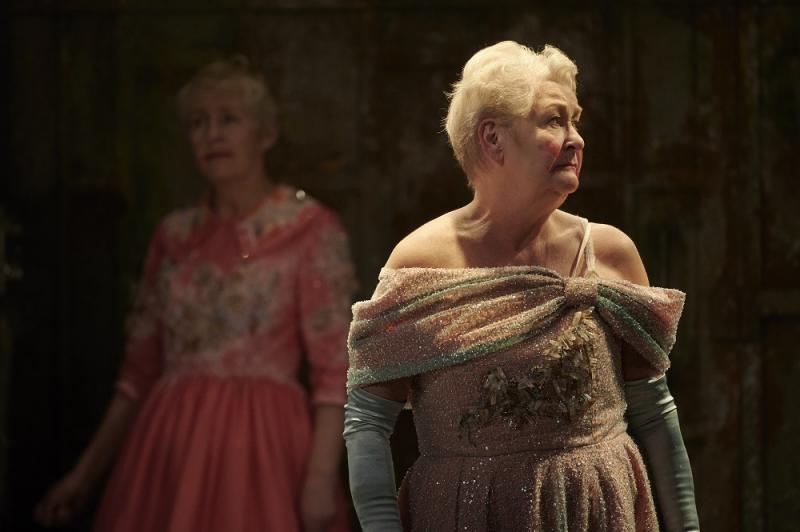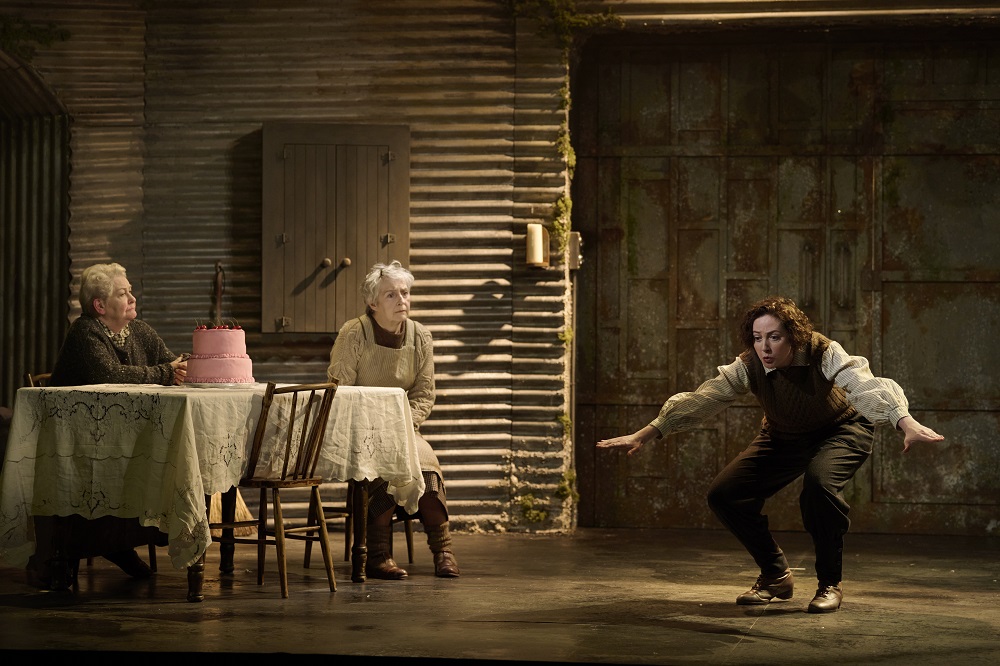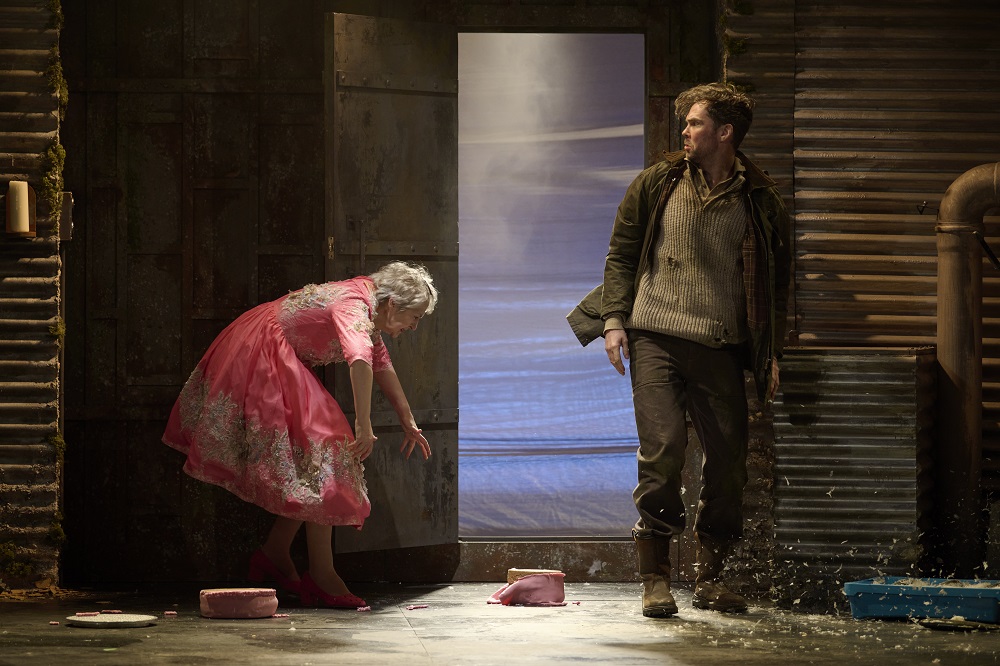The New Electric Ballroom, Gate Theatre, Dublin review - fantasy and memory hauntingly interwoven | reviews, news & interviews
The New Electric Ballroom, Gate Theatre, Dublin review - fantasy and memory hauntingly interwoven
The New Electric Ballroom, Gate Theatre, Dublin review - fantasy and memory hauntingly interwoven
Enda Walsh's second drama on now about ritualised isolation is mesmerising

Commuting between London and Dublin has its fascinations.10 days ago, I saw for the first time at the Southwark Playhouse’s Elephant Theatre, heart in mouth during most of it, Enda Walsh’s The Walworth Farce, his first Edinburgh Festival Fringe First winner in 2007. Then to Dublin’s Gate Theatre last night for its immediate successor in the Walsh canon and 2008 Edinburgh triumph, The New Electric Ballroom.
You could say these possible masterpieces form a diptych, though in an ideal world the substantial dramas would be played on alternating nights, never on the same evening, and despite riffs on the Irish love of endless talk, the connections aren’t in place or character. What we do have in each case is an hermetically sealed threesome, including two young brothers in the first play, two old sisters in the second, acting out a past – true or fantasy – into which an outsider is incorporated.  Here, at home in an Irish fishing town, siblings Breda and Clara reminisce about erotic entanglements and disappointments surrounding their teenage excursions to the escapist world of the New Electric Ballroom. Walsh adds layers of metatheatre, though: they’re being schooled for their lines by the younger woman of the house, Ada (Orla Fitzgerald pictured above on the right, with Barbara and Jane Brennan as Breda and Clara) , who’s barely coping with frustrations of her own. Into their daily lives with the changing of the tides comes fish-seller Patsy, longing for tenderness but pursued by a dangerous mind.
Here, at home in an Irish fishing town, siblings Breda and Clara reminisce about erotic entanglements and disappointments surrounding their teenage excursions to the escapist world of the New Electric Ballroom. Walsh adds layers of metatheatre, though: they’re being schooled for their lines by the younger woman of the house, Ada (Orla Fitzgerald pictured above on the right, with Barbara and Jane Brennan as Breda and Clara) , who’s barely coping with frustrations of her own. Into their daily lives with the changing of the tides comes fish-seller Patsy, longing for tenderness but pursued by a dangerous mind.
While The Walworth Farce pursues new layers of let’s-make-a-play madness, The New Electric Ballroom is about ritual repetition – as Lampedusa’s The Leopard has it, “everything must change so that everything can stay the same”. The possibility of a sea-change renders this a putative Shakespearean late romance to the tragicomedy of the previous play. Unease and a sense of liberation alternate in the last third of the drama.  As with the review of The Walworth Farce, no spoilers, but it has to be stated that Marty Rea as Patsy rises to mesmerising heights of speech and song in those later stages (Rea pictured above with Jane Brennan). But Walsh also gives everyone monologues great and small. Orla Fitzgerald as Ada realises the lyrical possibilities which finally reach her, while it’s a real coup to have real-life sister actors Barbara and Jane Brennan etching contrasts – also great and small – between dominating Breda and more cautious Clara. Kat Heath’s set and above all costumes achieve the crucial magic and strangeness in perfect harmony with Ciaran Bagnall’s chameleonic lighting, all at the service of Emma Jordan’s production.
As with the review of The Walworth Farce, no spoilers, but it has to be stated that Marty Rea as Patsy rises to mesmerising heights of speech and song in those later stages (Rea pictured above with Jane Brennan). But Walsh also gives everyone monologues great and small. Orla Fitzgerald as Ada realises the lyrical possibilities which finally reach her, while it’s a real coup to have real-life sister actors Barbara and Jane Brennan etching contrasts – also great and small – between dominating Breda and more cautious Clara. Kat Heath’s set and above all costumes achieve the crucial magic and strangeness in perfect harmony with Ciaran Bagnall’s chameleonic lighting, all at the service of Emma Jordan’s production.
A total work of art, in short: it may make you uncomfortable, and you may even wonder what the hell’s going on at moments, but that's what great theatre ought to do. And meanwhile in Dublin, there's a handsome-looking production of Molière's Tartuffe over at the Abbey Theatre, in a new version by Frank McGuinness which has all the rhyming-couplet pith, and keeps the length, of the original, and with several outstanding performances; excellent exhibitions; and of course the staggeringly high-level Irish National Opera production of Der Rosenkavalier. Ireland's arts, at least, seem to be thriving, with proper support right now.
The future of Arts Journalism
You can stop theartsdesk.com closing!
We urgently need financing to survive. Our fundraising drive has thus far raised £49,000 but we need to reach £100,000 or we will be forced to close. Please contribute here: https://gofund.me/c3f6033d
And if you can forward this information to anyone who might assist, we’d be grateful.

Subscribe to theartsdesk.com
Thank you for continuing to read our work on theartsdesk.com. For unlimited access to every article in its entirety, including our archive of more than 15,000 pieces, we're asking for £5 per month or £40 per year. We feel it's a very good deal, and hope you do too.
To take a subscription now simply click here.
And if you're looking for that extra gift for a friend or family member, why not treat them to a theartsdesk.com gift subscription?
more Theatre
 Mary Page Marlowe, Old Vic review - a starry portrait of a splintered life
Tracy Letts's Off Broadway play makes a shimmeringly powerful London debut
Mary Page Marlowe, Old Vic review - a starry portrait of a splintered life
Tracy Letts's Off Broadway play makes a shimmeringly powerful London debut
 Little Brother, Soho Theatre review - light, bright but emotionally true
This Verity Bargate Award-winning dramedy is entertaining as well as thought provoking
Little Brother, Soho Theatre review - light, bright but emotionally true
This Verity Bargate Award-winning dramedy is entertaining as well as thought provoking
 The Unbelievers, Royal Court Theatre - grimly compelling, powerfully performed
Nick Payne's new play is amongst his best
The Unbelievers, Royal Court Theatre - grimly compelling, powerfully performed
Nick Payne's new play is amongst his best
 The Maids, Donmar Warehouse review - vibrant cast lost in a spectacular-looking fever dream
Kip Williams revises Genet, with little gained in the update except eye-popping visuals
The Maids, Donmar Warehouse review - vibrant cast lost in a spectacular-looking fever dream
Kip Williams revises Genet, with little gained in the update except eye-popping visuals
 Ragdoll, Jermyn Street Theatre review - compelling and emotionally truthful
Katherine Moar returns with a Patty Hearst-inspired follow up to her debut hit 'Farm Hall'
Ragdoll, Jermyn Street Theatre review - compelling and emotionally truthful
Katherine Moar returns with a Patty Hearst-inspired follow up to her debut hit 'Farm Hall'
 Troilus and Cressida, Globe Theatre review - a 'problem play' with added problems
Raucous and carnivalesque, but also ugly and incomprehensible
Troilus and Cressida, Globe Theatre review - a 'problem play' with added problems
Raucous and carnivalesque, but also ugly and incomprehensible
 Clarkston, Trafalgar Theatre review - two lads on a road to nowhere
Netflix star, Joe Locke, is the selling point of a production that needs one
Clarkston, Trafalgar Theatre review - two lads on a road to nowhere
Netflix star, Joe Locke, is the selling point of a production that needs one
 Ghost Stories, Peacock Theatre review - spirited staging but short on scares
Impressive spectacle saves an ageing show in an unsuitable venue
Ghost Stories, Peacock Theatre review - spirited staging but short on scares
Impressive spectacle saves an ageing show in an unsuitable venue
 Hamlet, National Theatre review - turning tragedy to comedy is no joke
Hiran Abeyeskera’s childlike prince falls flat in a mixed production
Hamlet, National Theatre review - turning tragedy to comedy is no joke
Hiran Abeyeskera’s childlike prince falls flat in a mixed production
 Rohtko, Barbican review - postmodern meditation on fake and authentic art is less than the sum of its parts
Łukasz Twarkowski's production dazzles without illuminating
Rohtko, Barbican review - postmodern meditation on fake and authentic art is less than the sum of its parts
Łukasz Twarkowski's production dazzles without illuminating
 Lee, Park Theatre review - Lee Krasner looks back on her life as an artist
Informative and interesting, the play's format limits its potential
Lee, Park Theatre review - Lee Krasner looks back on her life as an artist
Informative and interesting, the play's format limits its potential
 Measure for Measure, RSC, Stratford review - 'problem play' has no problem with relevance
Shakespeare, in this adaptation, is at his most perceptive
Measure for Measure, RSC, Stratford review - 'problem play' has no problem with relevance
Shakespeare, in this adaptation, is at his most perceptive

Add comment